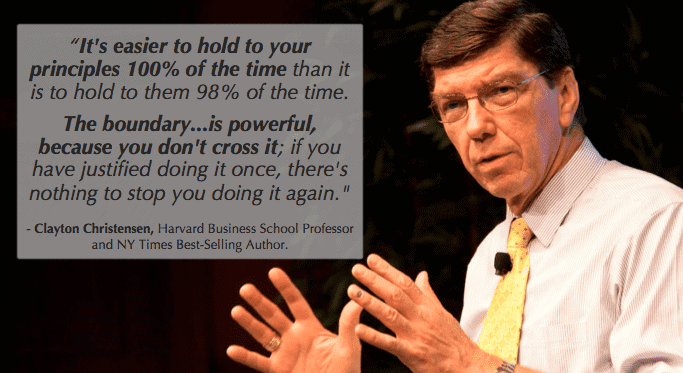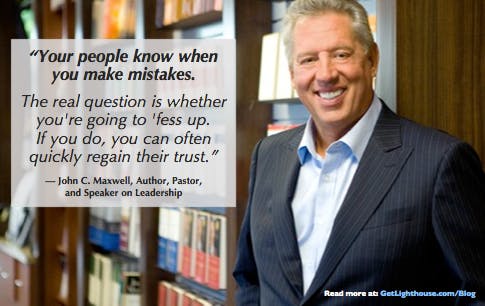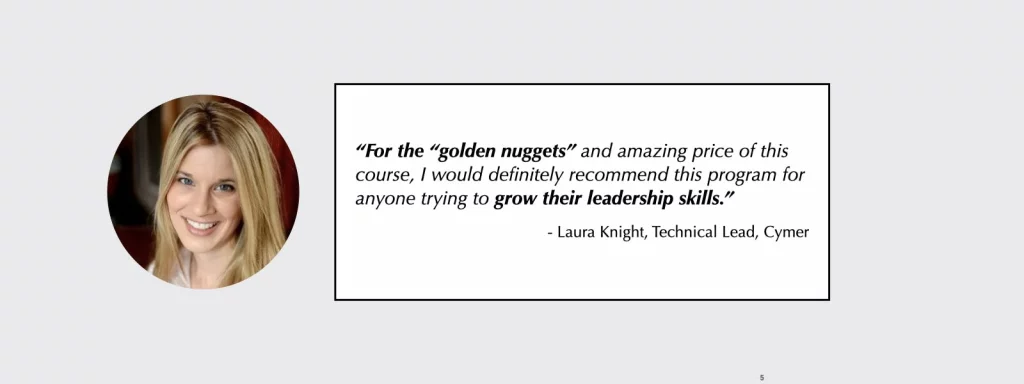Ever make a mistake you really wish you could take back? Ever been really tempted to make a compromise that deep down you know you shouldn't?
In today’s edition, we look at a key lesson from our Book of the Month about compromising on your principles, explore how you can rebuild trust after a betrayal with your team, learn a helpful communication tactic for our remote work world, and give you 7 great ways to think about your growth as a leader.
Let’s dive in…
Table of contents:
- 🥘 Food for Thought on Flashtags to convey better context
- 📚 Book of the Month on my Favorite Lesson from How Will You Measure Your Life
- 🙋 Ask Lighthouse on Rebuilding trust after it was broken
- 👩🏫 Learn How you can Master Your Most Important Work Relationship
Note: This is a preview of our weekly leadership newsletter, Lighthouse Leadership Weekly (LLW).
To get this sent to your inbox every week, along with our latest long form essays on this blog, you can sign up here.
🥘 Food for Thought
"I have an opinion on everything, literally everything. So if you ask me a question, I will have it. It won't be thought out. It won't be right, but I will have one, right?
And so the challenge is people will kind of take that and over index on what was my opinion.
And because it's inefficient to qualify every time someone asks you something, or every time you put an email out there and say, "oh, by the way, this is just my opinion."
...Here's what flash tags are literally...It's like the hashtag that we all know, but it's a discrete set of them, an escalating set of what I call the kind of dying on the hill spectrum."
- Dharmesh Shah, CTO and co-founder of HubSpot
Have you ever had the problem where you make a comment or suggestion to a team member and they drop everything to do what you said?
Ever make a comment and see that your team took it as Gospel, causing delays, unnecessary changes, or a total reset you never intended?
Chances are you have, especially in our world today where a chat message or email may have given people an impression of more importance than intended; they can't read your body language and tone in text after all.
If you want to avoid this happening, I love what Dharmesh Shah shared on Lenny's Podcast recently around "Flash Tags":
It turns out, Dharmesh has a full blog post on the subject here. And this is the important excerpt on the 4 categories: (Formatting has been added by me, all words quoted are Dharmesh's)
LEVEL 1: #fyi --
Had this thought/idea/article/video/whatever pass through my brain. I haven't spent a lot of time thinking about it. You can read it or not. Act on it or not. No response needed or expected.
Hill Dying Status (am I willing to die on this hill): I don't even see a hill.LEVEL 2: #suggestion --
Here's something I would do if I were you. But, I'm not you -- and you own this, so your call. Just consider it and weigh it against other things you're considering. I won't be offended if you go another way. A quick reaction/response would be appreciated (so I can learn what kinds of suggestions are useful/valuable), but is not necessary.Hill Dying Status: I saw the hill, but didn't feel strongly enough to commit the calories to climb it.
LEVEL 3: #recommendation (or #strongrecommendation) --
I've thought about this a lot. It's kept me up at night. I dug in. I think I understand the tradeoffs. You can choose not to take the recommendation, and go your own way, but please do it for good reasons. Please dig in a bit yourself and have a well-reasoned rationale for why you don’t want to take the recommendation.Please don’t ignore or dismiss it out of hand. A response (either way) is politely requested. If it's a #strongrecommendation then a response explaining why you're not taking it is probably a good idea.
Hill Dying Status: I climbed the hill. I breathed deeply I contemplated my life. I walked back down.
LEVEL 4: #plea --
We don't like issuing edicts or directives at HubSpot. But...please, please, please just do this. Trust works both ways, and I need you to trust me on this. If you still feel compelled to resist, something’s not right, let's chat. Maybe even in (gasp!) person.Hill Dying Status: Dying on a hill is not on my bucket list, but if it were this would be a really good candidate.
This is the kind of easy tactic you can add to your tool kit as a leader and avoid a bunch of headaches down the line.
And especially in a world we know is dominated by fully remote as well as hybrid teams, you really need these kinds of tactics to avoid unintended problems.
You can use these 4 levels as is, or if you want to add some of your own personality, or tailor it to what makes sense in your industry, consider changing the 4 levels to things obvious to your team and industry.
Regardless of what you call them, it helps quickly communicate valuable context the next time you need to send a team member a message or make what you think is a quick comment or request.
📚 Book of the Month on my Favorite Lesson from How Will You Measure Your Life
Last week, we introduced this month's Book of the Month: Harvard Business School Professor Clayton Christensen's, "How Will You Measure Your Life"
This week, we share my favorite lesson from the book:

I love this quote from Clayton. It's such an important message, but one that gets re-learned by leaders every day.
Are you a 98% or 100% kind of person?
In today's world it is tempting to compromise on our values every single day. A silent acceptance here, or tacit approval there. A little white lie here, or an error by omission there. A "just this one time" here, and a "no one will notice" there.
They add up.
And people do notice.
Leaders are always in the spotlight.
One of the most important lessons to learn as a leader is that you are ALWAYS in the spotlight. Your team is watching and taking note, even if they're not always vocal about it.
Your peers are watching, too.
Your credibility and reputation is only as clean as your actions.
No one is expected to be perfect, but that's very different from outright violating a key value, acting unethically or immorally, or breaking your word.
This is also why one of the dirty secrets I learned in Silicon Valley is just how often the values on posters on the walls in so many of the offices were meaningless. As Rand Fishkin, former founder of SEOmoz wrote:
"If you're trying to figure out what a company's values really are, look at the decisions management makes when lots of money, risk, or loss of face for executives is at odds with the stated values.
Want to know the company's mission & vision? Look at what they've intentionally chosen not to do, even though it could be lucrative."
This is what makes leadership so hard, and it so easy for companies to fall from grace; the pressure makes it oh so easy to slip from 100% to 98%.
And as Clayton writes in his book, that can make all the difference:
- When you stick to your values, you often avoid disaster. You don't make that sketchy investment or bad deal.
- When you slip, the fall can be hard and fast. Prosecutors don't care if this was your first time or 10th time breaking the law, as a number of Clayton's classmates learned.
The Slope is Very Slippery.
The most important thing to learn from this is that the slippery slope is very real on making compromises on your principles and values.
All it takes is one time and you break the trust of your team. You're just another hypocrite manager, or "do as I say, not as i do" kind of person. The eye rolls and dragging feet are not far behind.
And even if you get away with it "just this one time", it becomes harder and harder to stick to that value or principle. Once you break it once, as Clayton says, "there's nothing to stop you from doing it again."
Are you a 100% kind of leader, or a 98% leader?
If this topic is on your mind, we have a full post deep diving on these kinds of challenges for leaders here:
The Leadership Paradox: How being Consistently Inconsistent makes Great Leaders
🙋 Ask Lighthouse on Rebuilding trust after it was broken
A reader wrote in with a simple, but powerful and important question:
"How do I rebuild trust with my staff if it becomes broken?"
Oof. This is a tough one. Not quite as friendly and easy as last week's about 1 on 1 questions. But with our discussion a moment ago about values, principles, and reputations, it seemed like the right time to tackle this question.
Rebuilding trust is definitely hard. Depending on the depth of the breaking of trust, it can take quite a while to rebuild trust.
A deep betrayal (like say they told you something in confidence you shared when you shouldn't, or they took the fall for something not their fault) can cause damage that will leave a scar (they won't share things again, or they will take purely "prove it first" attitude, etc).

Yet, there are a few things you can do, which will help start to repair the issue:
- Acknowledge your mistake as fast as possible. The longer you delay admitting it, the more damage is done. If you need time to regroup, tell anyone who called you on it or involved, "You're right. I'm working on the issue and will get back to you on Day X." This is your first chance to rebuild trust by keeping that date's promise if you need some time.
- Apologize without reservation. When you break someone's trust, they don't care about your excuse. Any attempts to make excuses will only make it worse. It's better to simply quickly admit to the issue and apologize as John C Maxwell states above.
- Clearly communicate what you'll do going forward. When you make a mistake, or break someone's trust, a lot of the damage is already done. However, you can make a difference by making an effort to do things differently going forward and telling them what you'll do in those cases. This could be explicitly asking for their permission before disclosing something to anyone else, committing to a different process or approach, or other safeguards.
- Ask for their feedback and really listen. Sometimes people will have feedback on your change of approach going forward. Other times, they just want to complain or vent to you for a bit. Regardless of which they're doing, you need to swallow your pride and listen. Once again, don't make excuses. Try not to be defensive. Give them a chance to really feel heard, and pay attention to what bothered them most about what you did. This will help you understand what you need to do most to repair things.
- Give it time, and hold yourself to a higher standard: Depending on the degree of betrayal, and how well you listen and repair things, it may take very little time, or a long time to repair your relationship with them. During this period, and going forward, realize you are on probation with them. A second betrayal will be it for you. Once is an accident, but two times is a pattern, so take this for the wake up call it must be if you want things to turn around.
Of course, all of this is hard work. It requires swallowing your pride, subverting your ego, and humbling yourself.
You can much more easily bury it, gaslight people, and move along like it doesn't matter.
Just don't expect your betrayed team members to be nearly as engaged and productive. No one goes the extra mile for bosses they don't like nor trust. Instead, people check out and do just enough to keep their job and go through the motions.
Betraying trust and making serious mistakes with your team is no laughing matter. How you handle it can define your career, and whether you have a loyal, productive team, or a toxic withdrawn one.
How have you handled betrayal? What hard lessons have you learned?
👩🏫 Learn how to Master Your Most Important Relationship
If you've read this newsletter for long, you know we have Lighthouse Lessons training programs that can teach you or a group of your managers how to be great leaders, while helping them connect and build bonds with each other.
But did you know we have 8 different programs you can choose from? (Learn about all of them here)
And today I want to talk about one of our most important programs: Mastering Managing Up
Master your most important relationship: The one with your Boss.
In this 10 lesson program, sent once per week, you learn how to better manage up to your boss regardless of the current state of your relationship with them.
Here's a breakdown of the 10 lessons:
- The most important step to a great relationship with your manager
- How to tell your manager you want to improve your relationship no matter its current state
- How to make your 1 on 1s with your manager the best hour of their week (and yours)
- Strengthening your relationship with your manager through feedback & praise
- How to use Task Relevant Maturity to work better with your manager
- How to make your team better at managing up to you
- The keys to delivering bad news that avoids the messenger being shot
- How to get more of what YOU want
- Getting in the driver’s seat for your career with the person who decides it most
- Troubleshooting tactics for the most difficult bosses
Each week, the lessons focus on one of these topics and shows you *exactly* how you can put that concept into practice with your manager.
If you're looking for a light-weight, actionable, and engaging way to level up how you or your managers work with their busy bosses, this is a great program for you to try. Like all of our Lighthouse Lessons programs, it's jam-packed with "golden nuggets" to help you grow no matter how busy you are...

If you're interested in the program, you can learn more and sign up here. Or reply to this email with more details about you and your group.
ps: If a friend sent this to you, sign up here to get this newsletter every Saturday morning: https://getlighthouse.ck.page/9aa103e62f
Sign up to get this newsletter & our latest blog posts straight to your inbox:




